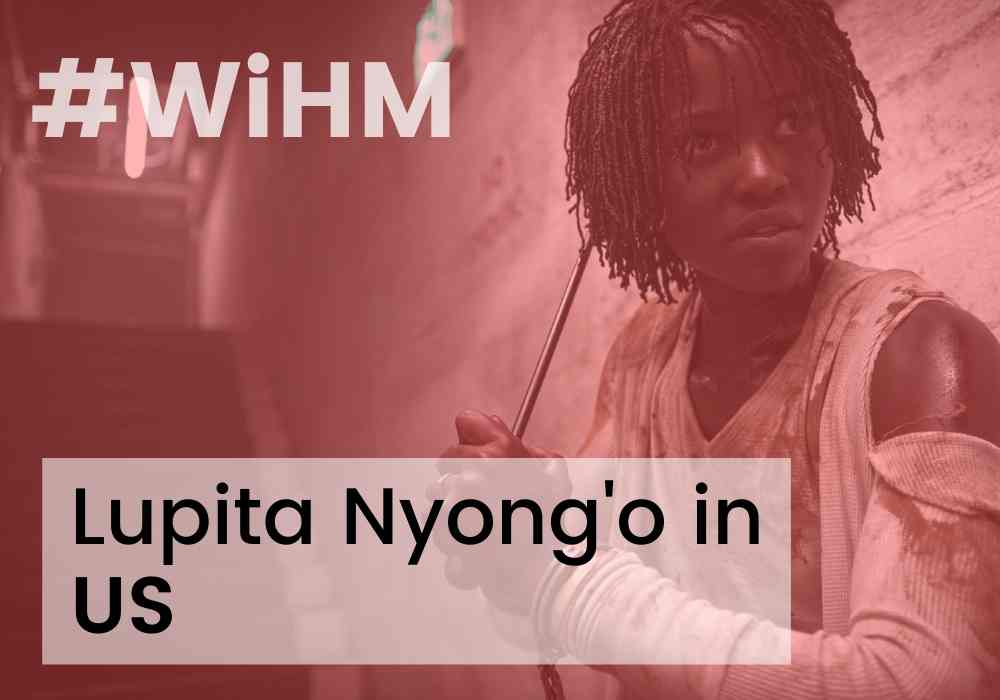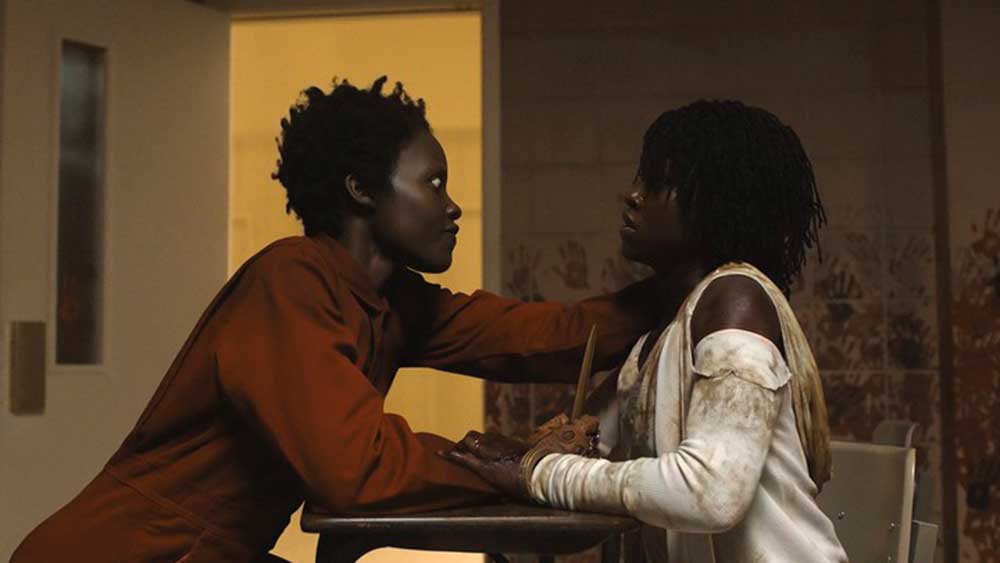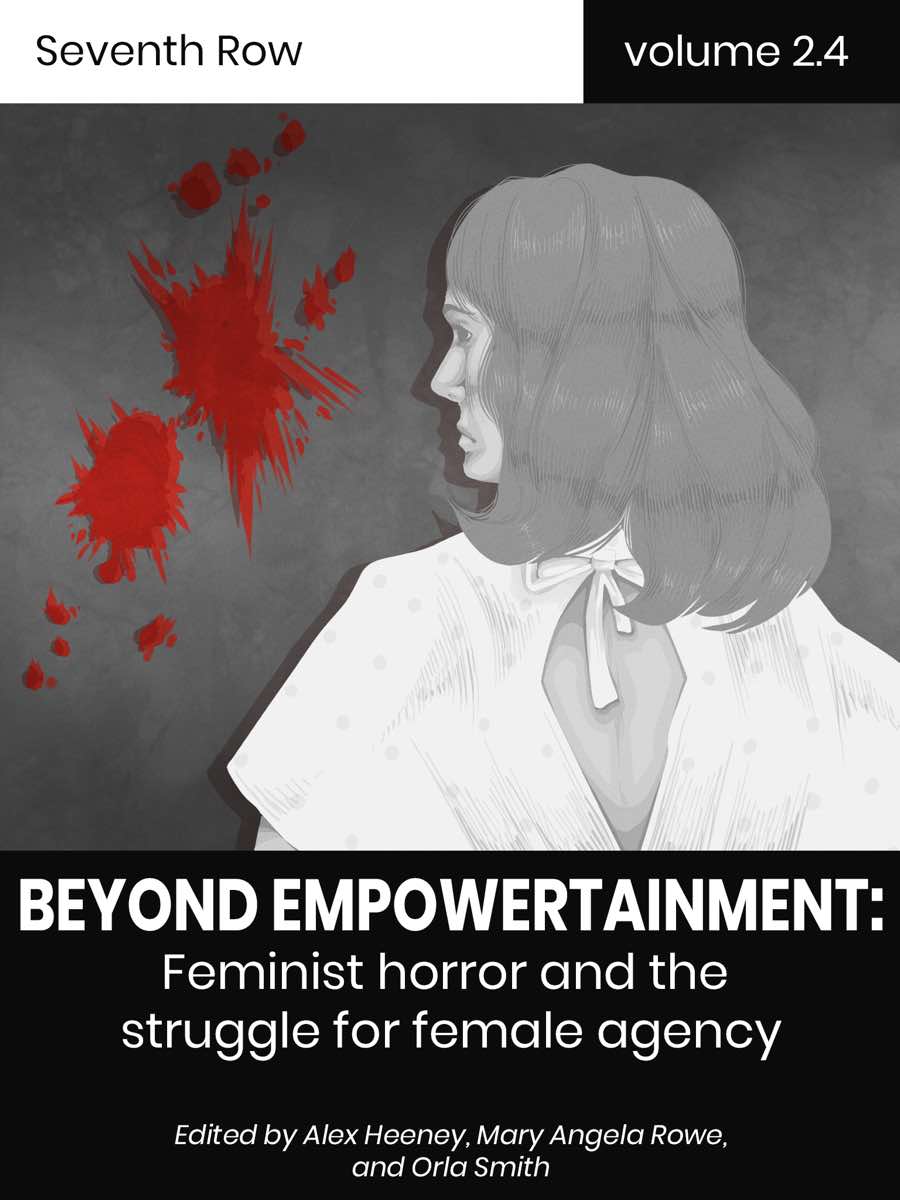Orla Smith discusses why Lupita Nyong’o’s performance in Us is one of her favourites by an actress in a horror film. Explore our coverage of Women in Horror Month here. Discover our book about feminist horror here.

As a happy family drives up to the beach in Us (2019), director Jordan Peele’s camera stays locked on the face of Adelaide (Lupita Nyong’o), staring out of the car window with a look of growing fear and anxiety. No amount of bright sunshine, happy chatter, or upbeat music blaring from the radio can distract from the magnetism of Nyong’o’s expression. She closes her eyes, breathing in and cricking her neck to the side as if preparing for battle. She forces a faint smile onto her face to keep up appearances, but it flickers on and off like a faulty light switch.
Later, when recounting a traumatic childhood memory that took place on that very beach — as a young girl, she glimpsed her own terrifying doppelganger in a fairground hall of mirrors — we only see Nyong’o’s back as she speaks. And yet, her tense stance and the fear in her voice instantly turns the attention away from Adelaide’s husband’s (Winston Duke) antics and transforms a comedic scene into a breathlessly tense one. Her voice quivers as she speaks, sentences ending in terse, frightened, upward inflections; her body shakes as she gesticulates, and her fingers look painfully stretched out and seized up. Nyong’o is surely in large part responsible for the nail-biting tension of Us; her evocation of fear is so visceral that it reaches out and envelops the viewer, too.
Nyong’o’s performance(s) in Us is the epitome of range: she plays two characters who represent opposing sides of American life and the human psyche. Adelaide is a well-off mother-of-two vacationing with her family in Santa Cruz; Red is her identical “shadow” who lives in squalor underground, playing out a nightmare copycat of Adelaide’s life. As Red laments in a hoarse rasp, “When the girl [Adelaide] ate, her food was given to her warm and tasty. But when the shadow was hungry, she had to eat rabbit, raw and bloody. On Christmas, the girl received wonderful toys. But the shadow’s toys were so sharp and cold, they sliced through her fingers when she tried to play with them.” While their bodies and minds are clones, a horrific upbringing has transformed Red into Adelaide’s monstrous id.

As Red, Nyong’o creates one of modern horror’s greatest monsters. Red may look like Adelaide, but the way she moves is more spiderlike than human, setting this performance deep in the uncanny valley. It’s a performance of quick and jerky movements: Red stands eerily still, but when she decides to move, she does so suddenly and at lightning pace. Her voice is so cracked and hoarse as to sound almost ghostly, and certainly supernatural, even though Red is a human being. This contrast between the human and the uncanny is what makes Red’s presence so terrifying.
But Nyong’o’s performance as Red is all the more impressive when contrasted with Adelaide — especially when Nyong’o’s two characters share the frame together and couldn’t seem more different from one another. Adelaide, while a seemingly more “normal” role — and certainly one closer to Nyong’o’s actual self (in that she’s not a murderous psychopath) — is deceptively complex. Nyong’o’s performance deepens on a second viewing, when the viewer is watching her with knowledge of the film’s twist: as children, Adelaide and Red switched places, meaning that Adelaide was secretly born into Red’s life of squalor before managing to escape it. Her nervousness in the car ride up to the beach might not simply be the anxiety of a woman faced with the source of unexplained trauma, but the anxiety of a woman who’s always felt like she didn’t belong, who is afraid of being found out. Adelaide begins to look a lot more like a woman with a secret. That Nyong’o is able to delicately balance all these possible interpretations of Adelaide is a credit to the nuance with which she reveals this guarded character’s interior life.
Us gave Nyong’o her first showcase role, allowing her to explore the horrific depths and multifaceted nature of the human consciousness. This complex leading role came after years of being mistreated and ignored by Hollywood, a fate all too common for dark-skinned black women in American cinema (it’s no coincidence that Peele, a black man, gave Nyong’o her first lead role). Nyong’o earned the Oscar for Best Supporting Actress for playing Patsey in 12 Years a Slave, her first role in a feature film. And yet, it was three years before Nyong’o was given another live action role, despite her incredible beauty and presence. Us is a blistering fuck you to everyone who overlooked her in the past decade, a cramming in of what should have been seven years of complex leading roles into a two-hour movie. It’s a promise of all the great things that should be to come for Lupita Nyong’o.
Explore our coverage of Women in Horror Month >>


